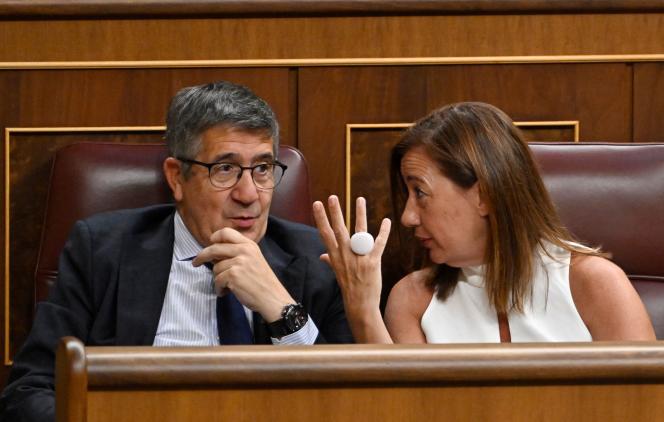The Socialist Party candidate for the presidency of the Congress of Deputies in Spain, Francina Armengol, was elected on Thursday 17 August thanks to a majority obtained in particular with the support of Carlos Puigdemont’s party, Junts per Catalunya (Together for Catalonia). The agreement reached with the separatist formation is a first success for Pedro Sanchez, who must face a vote of investiture, at the end of August or the beginning of September, in a Parliament where the right and the left have had an equal vote for the last legislative elections.
Francina Armengol, 52, won 178 votes, two more than the absolute majority, including the votes of the seven deputies of the party representing the hardest current of Catalan nationalism. The agreement, which would have been concluded in the early hours of the morning, would have enabled the Socialist Party and its allies to obtain the votes of the seven deputies of the party led by the independence leader, exiled in Belgium and wanted by the Spanish courts. since 2017, and the failure of an attempt to secede from Catalonia.
Negotiations to convince the Catalan separatist deputies
This Thursday’s vote is the first round of a battle whose outcome depended on the decision of Junts, that is to say of Carles Puigdemont. This paradox stems from the results of the July 23 legislative elections, which saw a much narrower than expected victory for the popular party; the two blocs, that of the outgoing government on the left and that of the right and the extreme right, can count on 171 votes each. In addition to the seven deputies of Junts, the deputy of a small Canarian party was also undecided.
This unexpected situation gave the central role to the Junts, granting it the power to decide whether Mr. Sanchez would continue to lead Spain or, if not, whether the country should hold new elections in the coming months. Negotiations continued until Thursday morning, in the greatest secrecy, to convince these seven Catalan independence deputies to vote for the Socialist candidate for the presidency of the Assembly.
That an independence party, which regards Spain as a foreign State and “oppressor”, is brought to decide his fate is not to displease Mr. Puigdemont, who wants to see if the situation can allow him to advance his cause. His two fundamental demands – a referendum on self-determination and an amnesty for all those prosecuted after the failed secession attempt – cannot be satisfied as such by Mr. Sanchez, for both legal and political reasons. The agreement which would have been concluded between the socialist party and Junts would be of much more modest scale, which means that Mr. Puigdemont would in fact have reconsidered these two demands to settle for more modest gains.
On Wednesday, Pedro Sanchez pledged to use the rotating presidency of the Council of the European Union, which Spain holds until the end of the year, to try to get Catalan – as well as Basque and Galician – be used in the European institutions in the same way as Spanish.
Outgoing Labor Minister Yolanda Diaz, who leads Sumar (the radical left-wing coalition allied with Mr. Sanchez), had already recently proposed making these regional languages working languages in the Congress of Deputies and the Senate. The choice of the candidate of the socialist party for the presidency of the Congress is also an outstretched hand to the Catalan separatists, since it is Francina Armengol, former president of the Balearic archipelago, a region culturally close to Catalonia, and who speaks Catalan fluently.
